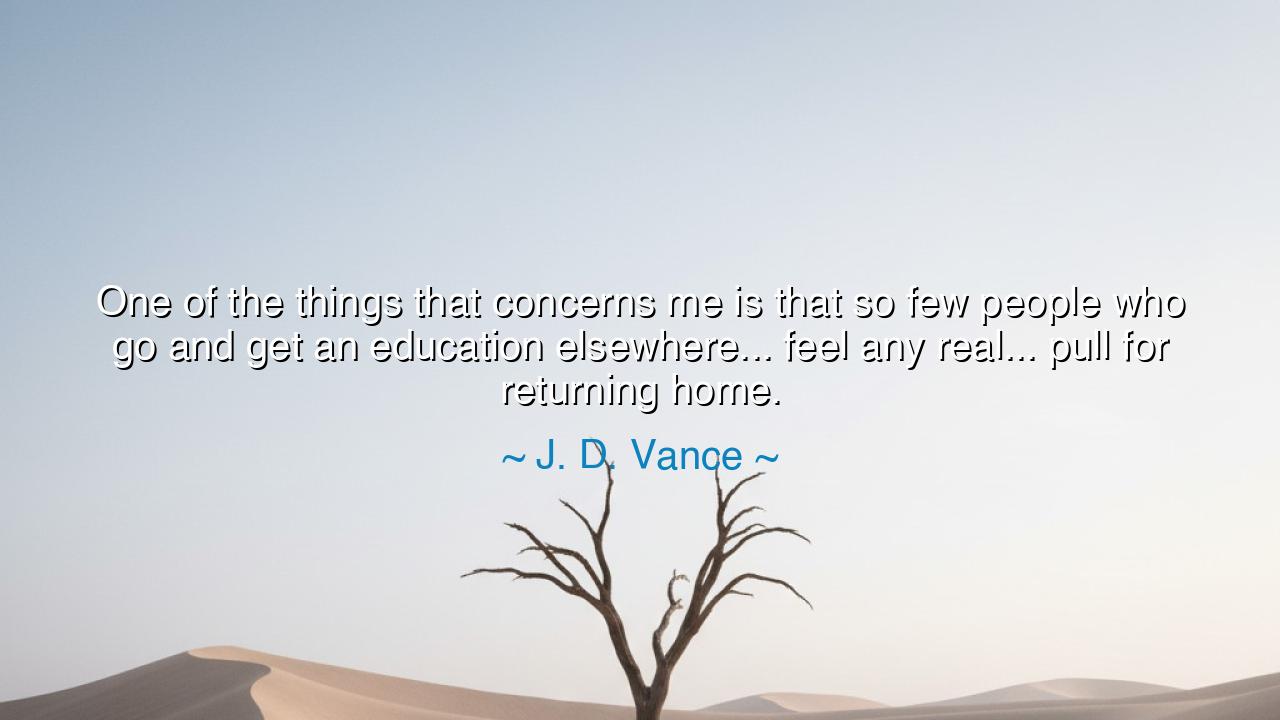
One of the things that concerns me is that so few people who go
One of the things that concerns me is that so few people who go and get an education elsewhere... feel any real... pull for returning home.






In the book of wanderers and hearths, a somber bell is struck: “One of the things that concerns me is that so few people who go and get an education elsewhere… feel any real pull for returning home.” Hear how each word leans on the next—education as ascent, elsewhere as horizon, pull as gravity, home as origin. The saying names an old drama: the young set sail on seas of knowledge and, finding new harbors bright with promise, forget the shoreline that first taught them the tides. What begins as pilgrimage hardens into exile; the village that invested in their dawn receives no share of their noon.
The ancients warned us about such unstitched journeys. A city keeps its soul when its rivers run both ways—sending out and drawing back. When only departure is honored, the well goes shallow. Grain is still milled, babies still born, roofs still leak; but the hands that could mend and lead are teaching faraway markets to pronounce their names. The proverb, then, is not a scold against education; it is a plea for the braided way: learning as departure and as homecoming.
Consider the green parable of Wangari Maathai. She studied in America and Germany, could have rooted her life in soft foreign soil, but the pull of Kenya drew her back. There she planted both trees and courage, founding the Green Belt Movement, turning scholarship into shade and policy into bread on the table. Her degrees did not estrange her from her people; they made her more fit to serve them. This is the counter-spell to the exile of success: to let the far country season you, then bring its harvest home.
We have other tales, darker, of towns unwoven by one-way roads. In coal valleys and farm counties, in fishing ports and factory grids, the brightest leave and the rest labor under thinner skies. The schoolhouse becomes a ramp, not a root; diplomas are wings with no roost. Elders sit on porches counting ghosts that should have been mentors. The marketplace learns to import answers for questions it once could solve. This is the cost the proverb laments: an elsewhere that hoards the talent a home helped to raise.
Yet the heart’s physics can be taught anew. If a people would increase the pull of returning home, they must dignify the work waiting there. Apprenticeships that pay, clinics that heal without humiliation, studios and labs that hum in small places—these are altars that call their priests back. A town that remembers birthdays, keeps letters, and names streets for teachers as well as generals becomes a place where the returned feel not reduced, but recognized. The concern in the quote becomes a charter: make home worthy of those you hope to welcome.
Let us also reckon with the pilgrim’s duty. The traveler must not let prestige drown gratitude. Write your elders’ names in your notebooks; carry their sayings like talismans. When your education gives you new tools, ask which problems of your first neighborhood they answer. The scholar who can translate the dialect of their birthplace into the language of grants and councils becomes a bridge; and bridges, not trophies, are what keep a people whole.
Take, then, this teaching for the road. First, practice a ritual of compass-setting: before each major step in elsewhere, ask, “How might this return?” Second, pledge a season of service—one summer, one sabbatical, one remote year—to your home, turning skill into structure. Third, build circles that pull: hometown fellowships, alumni co-ops, maker spaces in vacant storefronts, “returning sabbaths” when the scattered gather to plan more than picnics. Fourth, honor those who do come back—tell their stories loudly, pay them fairly, seat them at deciding tables.
And if you are the keeper of a place, kindle the beacon. Make your schools pathways that loop, not ladders that vanish into cloud. Bless the young as they leave, then write to them without shame as you invite them returning home—not to shrink, but to shape. For a people prospers when its rivers remember the sea and the spring; when education sends its children far enough to grow, and love calls them near enough to give. Only then will the old fear quiet, and the village that raised them hear the good noise of keys in familiar doors.






AAdministratorAdministrator
Welcome, honored guests. Please leave a comment, we will respond soon